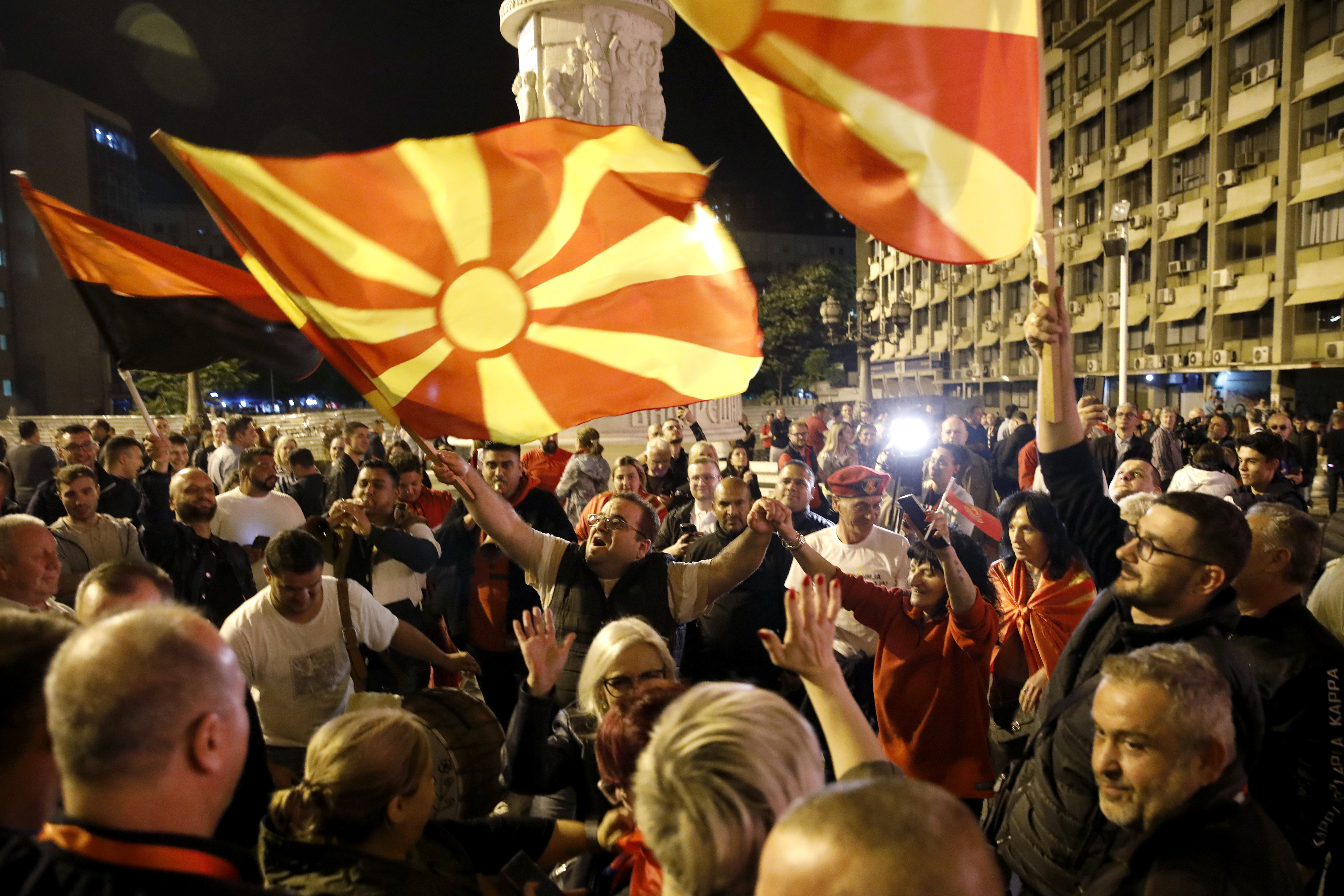North Macedonia
The Conservative resurgence in North Macedonia: Electoral Triumph amid a need for progressive agenda

Supporters of the opposition center-right VMRO-DPMNE party celebrate in front of the party headquarters after their party announced victory in the presidential and parliamentary elections, in Skopje, North Macedonia, late Wednesday, May 8, 2024.
© picture alliance / ASSOCIATED PRESS | Boris GrdanoskiThe elections on 8 May in North Macedonia represented a significant turning point in the nation's political landscape. The conservative opposition, led by the VMRO-DPMNE party, scored a sweeping victory by triumphing in both the presidential and parliamentary contests. Gordana Siljanovska-Davkova, an independent candidate endorsed by VMRO-DPMNE and a former law professor, secured the presidency with a stunning 65% of the vote, making history as the country's first female president. In the parliamentary arena, the VMRO-DPMNE-led coalition, known as "Your Macedonia," garnered 43% of the votes, narrowly missing a majority with 58 out of 120 parliamentary seats. Meanwhile, the incumbent Social Democratic Union of Macedonia (SDSM) faced significant setbacks, securing only 15.3% of the vote and 18 parliamentary seats, representing a drastic decline compared to previous elections.
Voters appear to have forgiven the conservative party, despite its semi-dictatorial regime until 2017, when the country experienced lack of space for critical voices, biased media, and lack of free economic competition. Overthrown by widespread street protests, known as the "Colourful Revolution," the coalition of centrist and right-wing parties has now reemerged as a dominant political force.
The Great Expectations of 2017 Fall Short
The ambitious pledges for sweeping reforms, intended to combat corruption, strengthen the rule of law, and elevate living standards, championed by the social democrats over their two consecutive terms, have largely remained unmet. Three decades since gaining independence from former Yugoslavia, the post-socialist state grapples with persistent economic and social challenges. The latest EU country report on North Macedonia highlights the continued prevalence of corruption in many sectors and underscores significant shortcomings in the rule of law. The relatively small and vulnerable economy, still reeling from the aftermath of the COVID crisis, struggles to meet the anticipated living standards, with one in three individuals living at or below the poverty line. Coupled with recurring corruption scandals and the ruling SDSM's inability to effectively address pressing issues, public support for the center-left coalition has waned.
Furthermore, fatigue among citizens with the constant need for compromise and the resolution of bilateral neighbouring country disputes has further weakened the position of the ruling parties. These disputes have left the impression that Macedonian national interests are disproportionately impacted. The resolution of the name dispute between North Macedonia and Greece as a prerequisite for NATO membership, along with the requirement to accept the so-called French proposal for the continuation of EU accession talks, dealt another blow to the popularity of the ruling coalition led by the Macedonian social democrats.
Coalition Dynamics
With just three mandates short of securing a parliamentary majority of 61 seats, VMRO finds itself in a position to seek support from smaller parties in parliament. The most likely coalition partner here would be the Albanian opposition (VREDI), which secured 13 parliamentary seats. The party seeks to break free from the shadow of its larger Albanian counterpart, the Democratic Union for Integration (DUI) in a strive for the ethnic Albanian votes, and unlike VMRO, it has a clear pro-EU agenda. VREDI will demand resolution of the Macedonia-Bulgaria identity-related issues, which currently hinder the opening of the negotiation process.
On the other hand, DUI faces isolation from governance, as the conservatives largely campaigned on ending their 20-year era of governance balancing.
The Macedonian Liberal Democrats (LDP) secured only one parliamentary seat in the Assembly. The party's principle of only coalitioning with political parties that unequivocally support the country's Euro-Atlantic path led them to form a pre-election coalition with the Social Democrats, potentially reducing their chances of securing at least two parliamentary seats, as they previously held. However, such a policy-oriented priority of the LDP could also serve as the basis for a coalition and participation in a future government led by VMRO-DPMNE, contingent upon the conservative party's clear commitment to the European path and integration agenda.
The populist far-right "Levica" party tripelled its support compared to previous elections and now holds six parliamentary seats. However, this does not translate into significant influence in parliament, and its radical stance is likely to isolate it politically.
The EU integration path in question
While both major political opponents in North Macedonia support the country’s EU integration, they diverge on how to address Bulgaria’s demand for the inclusion of a Bulgarian ethnic minority recognition in North Macedonia's constitution. This demand, part of the EU negotiations framework since 2022, known as the “French proposal,” has yet to garner political consensus due to deep-seated identity sentiments on both sides. While Social Democrats and ethnic Albanian parties are in favor of the constitutional changes, VMRO-DPMNE rejects what it views as “Bulgaria’s dictate,” hinting it might seek potential renegotiations of membership terms.
The Prespa Agreement, which resolved the longstanding name dispute with Greece in 2017 and paved the way for North Macedonia’s NATO accession, introduced the "North" prefix to Macedonia's name. The newly elected President Siljanovska-Davkova's commitment to the official name, but reluctance to embrace this prefix in her appearances and insistence on using only “Macedonia” as country’s name underscores simmering tensions over national identity. Despite her overall pro-European stance, this stance could exacerbate nationalist sentiments and strain relations with the country's southern neighbor.
Charting North Macedonia's Course: Anticipating the Future
As North Macedonia navigates its post-election landscape, the choices made in the coming months will be critical. Addressing corruption, resolving bilateral disputes, and advancing EU integration efforts will shape the country's future trajectory. The stakes are high, and the decisions taken now will determine North Macedonia's position on the European stage for years to come.
Ivaylo Tsonev, Senior Project Coordinator for Bulgaria and North Macedonia, FNF.
